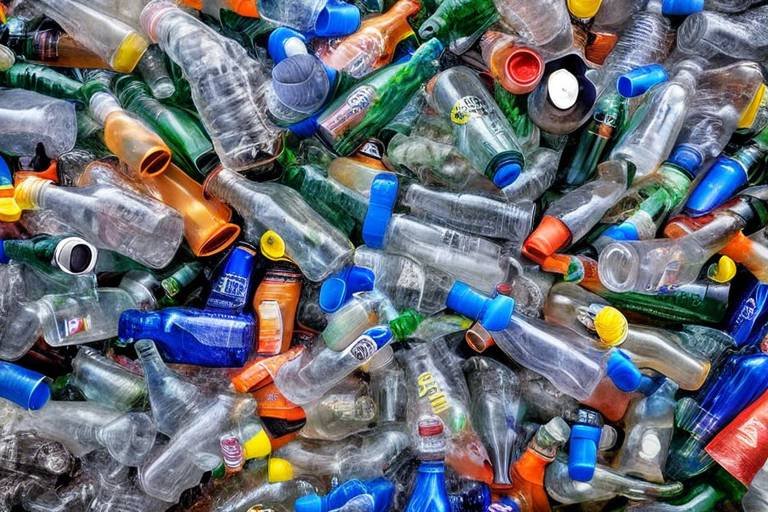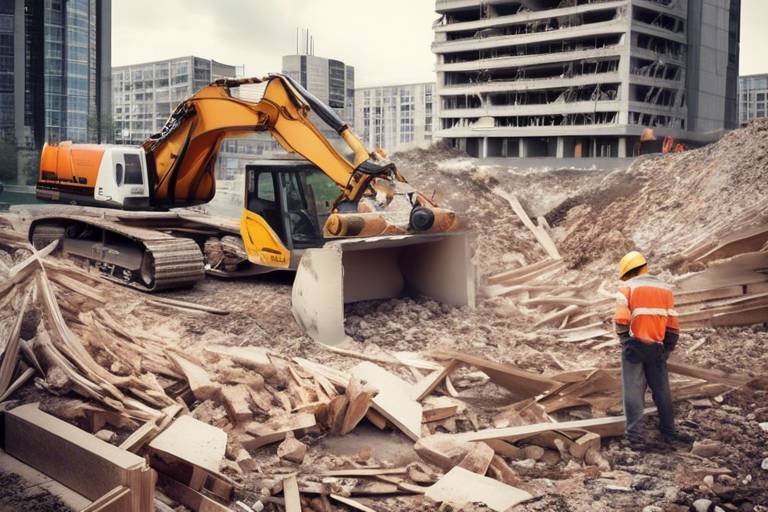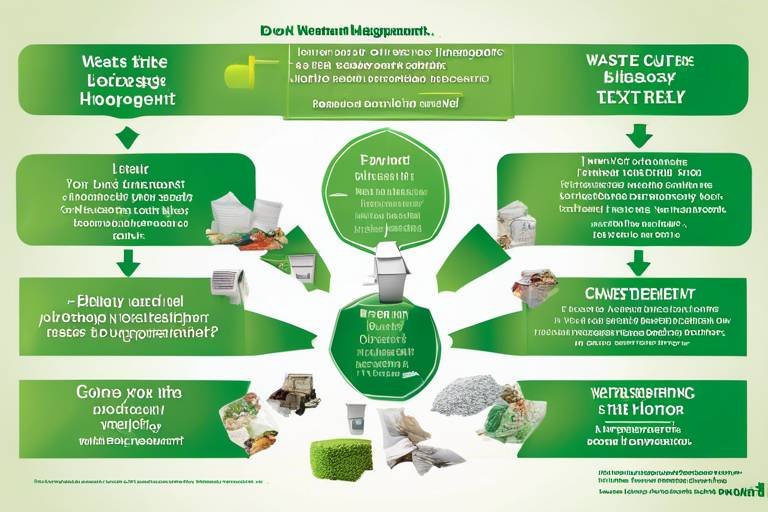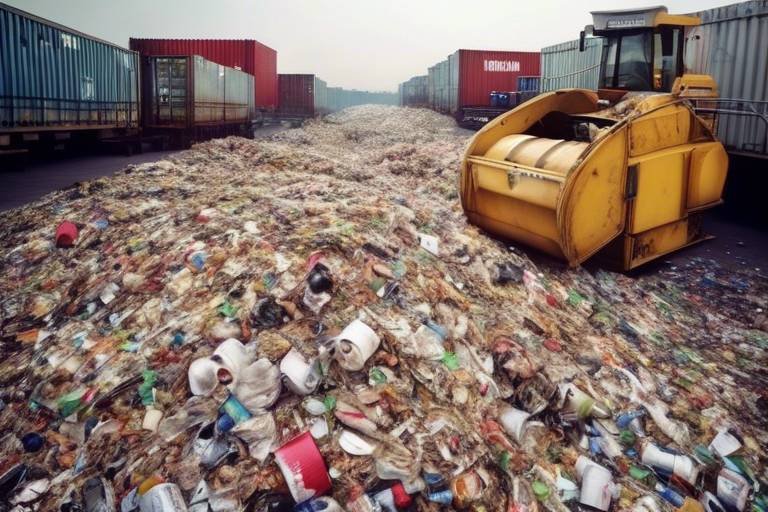Why Is Organic Waste Recycling Important?
Organic waste recycling is not just a trendy buzzword; it’s a crucial practice that impacts our environment and future. Imagine a world where food scraps and yard debris don’t end up in overflowing landfills, but instead, they are transformed into nutrient-rich compost that nourishes our soil. This process not only reduces waste but also promotes sustainability and environmental health. The significance of organic waste recycling lies in its ability to create a cycle of renewal, where waste becomes a resource rather than a burden.
In our rapidly changing world, the importance of recycling organic waste cannot be overstated. With landfills reaching capacity and climate change knocking at our door, we must rethink how we manage waste. By recycling organic materials, we can significantly lower the amount of waste that ends up in landfills, which is a win-win for both the environment and our communities. Furthermore, organic waste recycling helps combat greenhouse gas emissions, particularly methane—a potent gas that contributes to global warming. It’s like giving Mother Earth a much-needed break!
But what exactly constitutes organic waste? Organic waste includes any biodegradable materials, such as:
- Food scraps (fruits, vegetables, leftovers)
- Yard waste (grass clippings, leaves, branches)
- Paper products (napkins, paper towels, cardboard)
Understanding the composition of organic waste is essential for effective recycling and composting methods. By properly sorting and processing these materials, we can create a closed-loop system that benefits everyone. It’s not just about throwing scraps into a bin; it’s about recognizing the potential of these materials to enrich our soil and reduce our carbon footprint.
As we delve deeper into the benefits of organic waste recycling, it becomes clear that this practice plays a pivotal role in fostering a sustainable environment. From reducing landfill waste and greenhouse gas emissions to enriching our soil, the advantages are manifold. Let’s explore these benefits in detail, shall we?
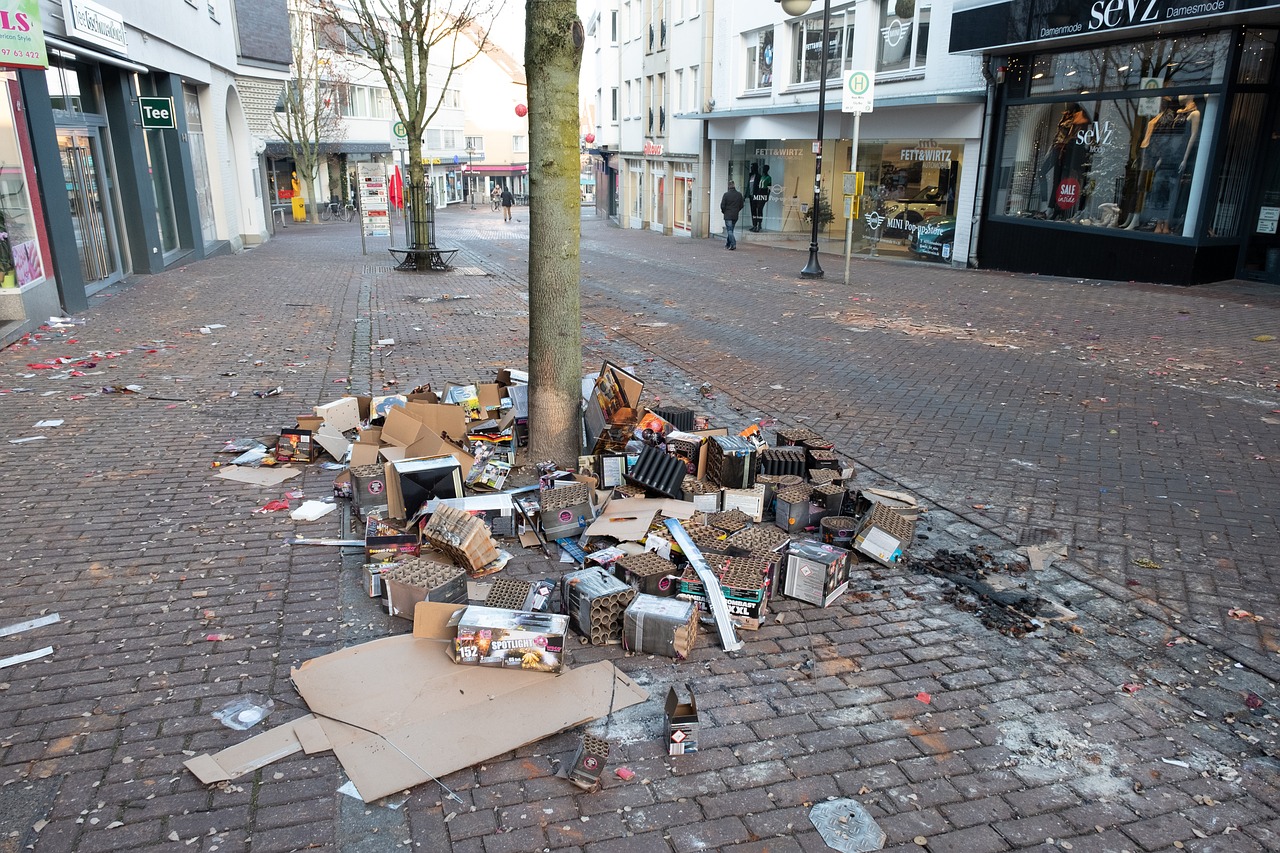
Understanding Organic Waste
Organic waste is a term that encompasses a variety of biodegradable materials, primarily originating from our kitchens and gardens. It includes food scraps, fruit and vegetable peels, coffee grounds, eggshells, and yard waste like grass clippings and leaves. But why should we care about what we toss in the trash? Understanding the composition of organic waste is crucial for effective recycling and composting methods. The more we know about what we produce, the better we can manage it sustainably.
When we think about organic waste, it’s easy to dismiss it as just garbage. However, it represents a valuable resource that can be transformed into nutrient-rich compost. This process not only diverts waste from landfills but also enriches the soil, promoting healthier plants and gardens. Imagine turning your kitchen scraps into black gold for your garden! This transformation highlights the potential of organic waste recycling and why it deserves our attention.
To better grasp the significance of organic waste, let's consider its components. Organic waste can be categorized into two main types:
- Food Waste: This includes all leftover food items, spoiled produce, and even bones. It’s estimated that nearly one-third of all food produced globally is wasted, which is a staggering figure.
- Yard Waste: Grass clippings, leaves, branches, and other plant materials fall into this category. During peak seasons, yard waste can account for a significant portion of municipal solid waste.
By understanding these categories, we can better strategize how to recycle and compost effectively. For example, did you know that certain food scraps, like citrus peels, can enhance the composting process by adding acidity? This knowledge allows us to optimize our compost piles and improve the quality of the end product.
Additionally, the composition of organic waste varies by region and season. In urban areas, food waste might dominate, while rural areas may produce more yard waste. Recognizing these differences is vital for local waste management programs to tailor their strategies accordingly. By engaging with our communities and sharing insights about what constitutes organic waste, we can foster a collective effort towards more sustainable practices.
In conclusion, understanding organic waste is not just about knowing what to recycle; it's about recognizing the potential it holds for environmental sustainability. By transforming our perception of waste into a resource, we can contribute to a cleaner planet and healthier ecosystems. Remember, every banana peel and grass clipping can make a difference if we choose to recycle it properly!
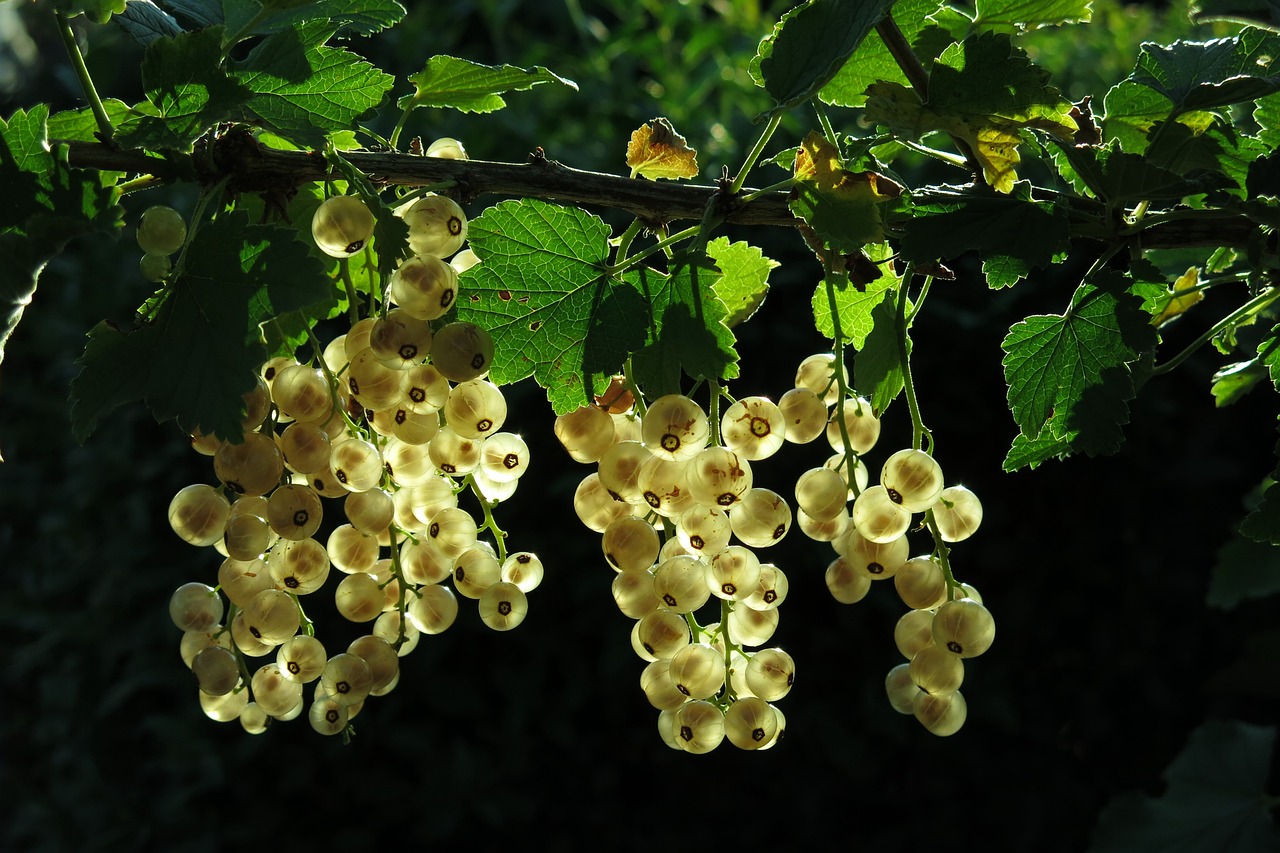
Environmental Benefits
The significance of organic waste recycling cannot be overstated, particularly when we consider its profound . By recycling organic materials, we are not only doing our part to protect the planet but also actively contributing to a healthier ecosystem. Imagine a world where our food scraps and yard waste are transformed into valuable resources instead of piling up in landfills. This transformation is crucial for several reasons, primarily focused on reducing landfill waste, lowering greenhouse gas emissions, and enriching our soil.
One of the most pressing issues we face today is the overwhelming amount of waste that ends up in landfills. When organic waste is diverted from these sites, we can significantly alleviate the overcrowding that plagues many waste facilities. This is akin to unclogging a busy highway: when we reduce the volume of waste, we not only prolong the lifespan of existing landfills but also promote a cleaner and more sustainable ecosystem. The less waste we create, the more resources we can allocate to managing what remains, leading to a more efficient waste management system.
Another critical aspect of organic waste recycling is its impact on landfill gas emissions. As organic matter decomposes in landfills, it produces methane, a greenhouse gas that is over 25 times more potent than carbon dioxide over a 100-year period. This is a significant contributor to climate change. By recycling organic waste, we can drastically reduce these emissions. It’s like turning off a leaky faucet: every drop counts, and in this case, every bit of organic waste recycled helps mitigate climate change.
Moreover, composting organic waste returns vital nutrients to the soil, enhancing its health and fertility. Healthy soil is the foundation of robust plant growth and agricultural productivity. When we compost, we are not merely disposing of waste; we are enriching the earth and fostering a sustainable cycle of growth. This process is essential for maintaining biodiversity and ensuring that our agricultural systems remain productive. Think of it as giving back to the earth—nourishing the very ground that provides us with food.
In summary, the environmental benefits of organic waste recycling are multifaceted and crucial for our planet's health. By reducing landfill contributions, lowering greenhouse gas emissions, and enriching soil, we are paving the way for a sustainable future. The more we embrace organic waste recycling, the brighter our environmental outlook becomes, ensuring a healthier planet for generations to come.
- What types of materials can be composted? Most kitchen scraps like fruit and vegetable peels, coffee grounds, and yard waste such as leaves and grass clippings can be composted.
- How does composting reduce greenhouse gas emissions? Composting prevents organic waste from decomposing in landfills, where it produces methane, a potent greenhouse gas.
- Can I compost in an apartment? Yes! There are many indoor composting solutions, such as worm bins or bokashi systems, that are suitable for small spaces.

Reducing Landfill Waste
When we talk about , it’s like taking a giant step towards a cleaner, healthier planet. Every piece of organic waste that we recycle, whether it's leftover dinner scraps or garden clippings, is a piece of waste that doesn’t end up in a landfill. Imagine a world where our landfills are not overflowing with garbage, but instead, we have vibrant green spaces where nature thrives. By actively engaging in organic waste recycling, we can make this vision a reality.
Landfills are often seen as a necessary evil, but the truth is, they come with a host of environmental issues. When organic waste decomposes in a landfill, it doesn’t break down in the same way it would in a compost pile. Instead, it gets trapped, leading to a buildup of harmful gases like methane. This potent greenhouse gas is over 25 times more effective at trapping heat in the atmosphere than carbon dioxide over a 100-year period. By recycling organic waste, we can significantly cut down on the amount of waste sent to landfills, and in turn, reduce these harmful emissions.
Consider this: every household generates organic waste daily. In fact, according to the Environmental Protection Agency (EPA), food waste alone accounts for about 22% of the total municipal solid waste generated in the United States. Now, if we could divert even half of that organic waste from landfills, we could save millions of tons of waste from entering these sites each year. It’s a simple yet powerful idea that can lead to a substantial impact on our environment.
Moreover, reducing landfill waste isn't just about the environment; it's also about community health. Landfills can be breeding grounds for pests and can release unpleasant odors that affect nearby neighborhoods. By recycling organic waste, we can minimize these health risks and enhance the quality of life for everyone in the community. It’s a win-win situation!
To put it into perspective, let’s look at some numbers:
| Type of Waste | Percentage of Landfill Contribution |
|---|---|
| Food Waste | 22% |
| Yard Waste | 13% |
| Other Organic Materials | 10% |
By recycling these materials, we can drastically reduce the overall percentage of waste that ends up in landfills. It’s not just an environmental issue; it’s a community issue, and we all have a part to play. So, next time you’re about to toss out those vegetable peels or grass clippings, think twice! Instead, consider composting them or participating in a local organic waste recycling program. Your actions can lead to a cleaner, greener future for all.
In conclusion, reducing landfill waste through organic waste recycling is essential for the health of our planet and our communities. It’s about making conscious choices that lead to lasting change. Let’s work together to create a sustainable future where waste is minimized, and our environment flourishes.

Landfill Gas Emissions
When organic waste ends up in landfills, it undergoes a natural decomposition process. However, this process isn't as straightforward as it seems. As organic materials break down anaerobically (without oxygen), they produce a range of gases, with methane being the most concerning. Methane is a potent greenhouse gas, and its impact on climate change is alarming. In fact, methane can be over 25 times more effective than carbon dioxide at trapping heat in the atmosphere over a 100-year period. This means that every ton of organic waste that is left to decompose in a landfill can contribute significantly to global warming.
To put things into perspective, let’s consider some statistics:
| Type of Waste | Methane Emissions (per ton) |
|---|---|
| Food Waste | 0.5 - 1.5 tons |
| Yard Waste | 0.2 - 0.6 tons |
| Paper Waste | 0.1 - 0.3 tons |
This table illustrates the potential methane emissions from various types of organic waste. The higher the organic content, the greater the methane production. By recycling organic waste through composting or anaerobic digestion, we can significantly reduce these emissions. Instead of letting waste rot in a landfill, we can transform it into valuable resources, such as compost or biogas, which can be used to generate energy.
Moreover, the reduction of landfill gas emissions not only benefits the environment but also improves public health. Landfills are often associated with foul odors, and the gases they emit can contribute to respiratory problems and other health issues in nearby communities. By opting for organic waste recycling, we are investing in cleaner air and a healthier community. It’s a win-win situation!
In summary, addressing landfill gas emissions is crucial for tackling climate change. By diverting organic waste from landfills, we can minimize methane production and its detrimental effects on our planet. It’s time to rethink our waste management practices, and organic waste recycling is a significant step in the right direction.
- What types of materials are considered organic waste? Organic waste includes food scraps, yard waste, paper products, and other biodegradable materials.
- How does composting reduce methane emissions? Composting allows organic waste to decompose aerobically, which significantly reduces methane production compared to anaerobic decomposition in landfills.
- Can I compost in my backyard? Yes! Many people successfully compost at home, creating nutrient-rich soil for their gardens.
- What are the benefits of composting? Composting enriches soil, reduces landfill waste, and decreases the need for chemical fertilizers.
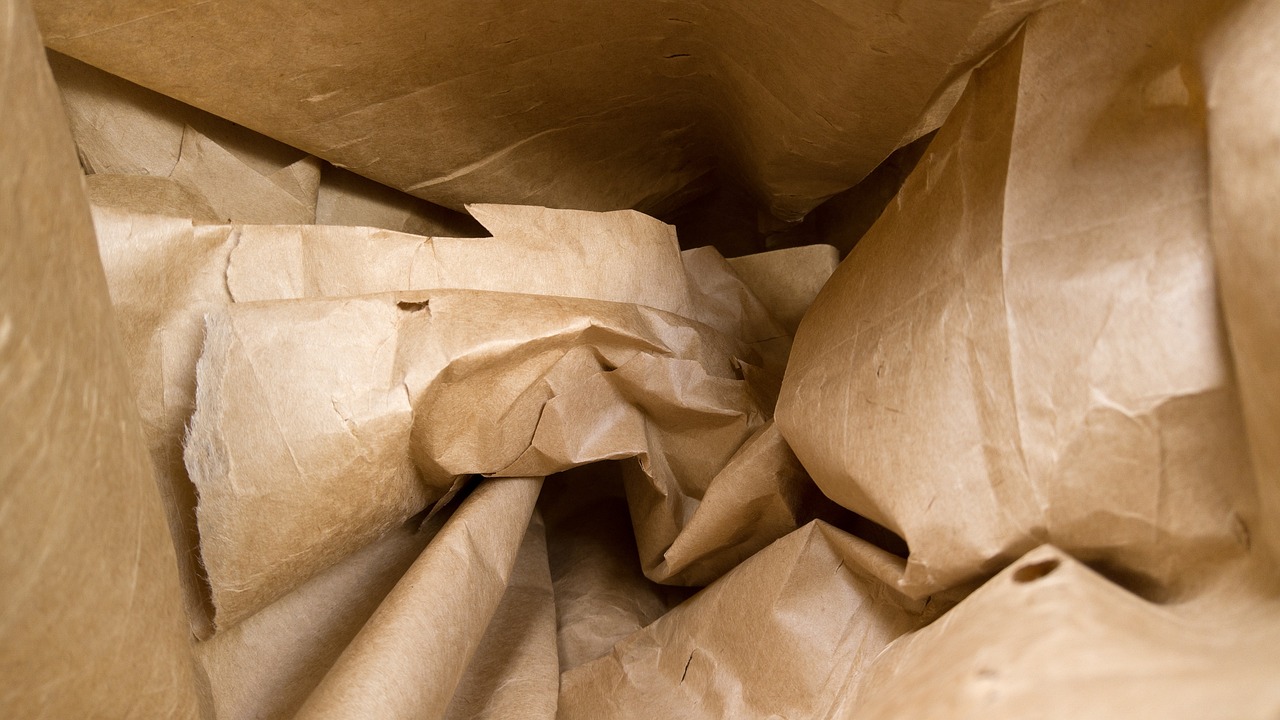
Soil Enrichment
When we talk about , we’re diving into one of the most significant benefits of recycling organic waste. Imagine your garden as a canvas, and organic waste as the vibrant paint that brings it to life. By composting food scraps and yard waste, we’re not just throwing away trash; we’re creating a nutrient-rich amendment that can transform our soil into a thriving ecosystem.
Composting organic waste returns essential nutrients back into the earth, enhancing the soil's quality and fertility. This is crucial for healthy plant growth and agricultural productivity. The process of composting breaks down organic materials into a rich, dark substance known as humus. Humus is the powerhouse of soil, providing a multitude of benefits:
- Improved Soil Structure: Humus helps bind soil particles together, creating aggregates that improve aeration and drainage.
- Enhanced Nutrient Retention: It increases the soil's ability to hold nutrients, making them available to plants over time.
- Water Retention: Healthy soil enriched with organic matter retains moisture better, reducing the need for frequent watering.
- Microbial Activity: Compost fosters a diverse community of microorganisms that enhance soil health and plant growth.
Moreover, the benefits of soil enrichment extend beyond individual gardens. When communities adopt organic waste recycling practices, they are contributing to a larger movement towards sustainable agriculture. Farmers can use compost to reduce their reliance on synthetic fertilizers, which not only saves money but also decreases the environmental impact associated with chemical runoff. This cycle of enriching the soil with organic matter creates a more resilient agricultural system that can withstand the challenges posed by climate change.
In essence, recycling organic waste is akin to giving back to the earth. It’s a natural way to nourish our soils, promote biodiversity, and ensure a sustainable future for generations to come. So next time you toss those vegetable peels or grass clippings into the compost bin, remember that you’re not just reducing waste—you’re enriching the very foundation of our ecosystem.
1. What types of organic waste can be composted?
You can compost a variety of organic materials including fruit and vegetable scraps, coffee grounds, eggshells, grass clippings, leaves, and small branches. Avoid composting meat, dairy, and oils as they can attract pests.
2. How long does it take for compost to be ready?
The composting process can take anywhere from a few weeks to several months, depending on factors like the materials used, the composting method, and environmental conditions. Regular turning and maintaining moisture can speed up the process.
3. Can composting help reduce my carbon footprint?
Absolutely! By composting organic waste, you’re diverting it from landfills where it would produce methane, a potent greenhouse gas. Instead, you’re creating a natural fertilizer that enriches the soil, helping to sequester carbon.
4. Is compost safe for all plants?
Yes, compost is generally safe for all plants. However, it’s best to let it mature fully before applying it to ensure that any pathogens or weed seeds have been killed off during the composting process.
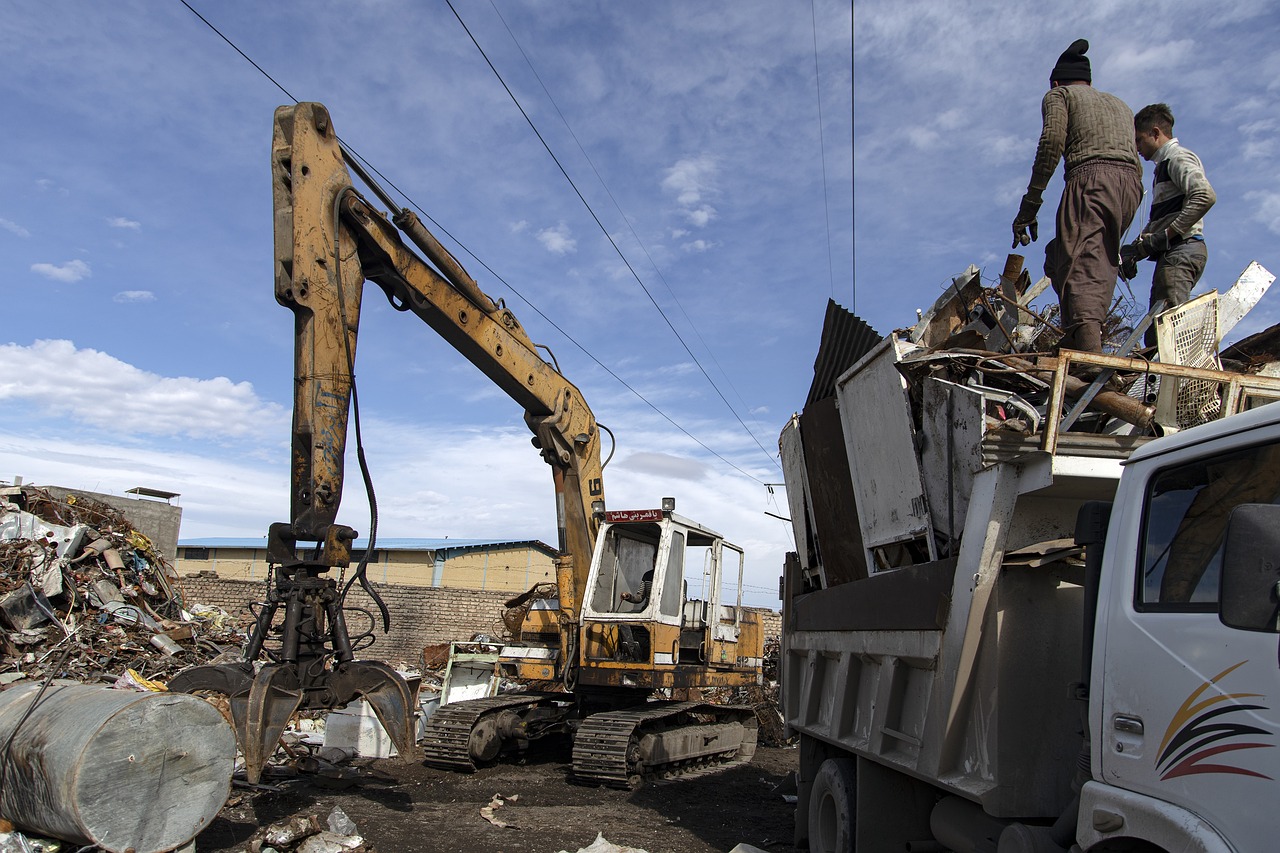
Conserving Resources
When we talk about , it's like hitting two birds with one stone. Recycling organic waste not only helps us manage our waste better but also plays a crucial role in preserving our precious natural resources. Imagine a world where we can reduce the need for synthetic fertilizers and lessen the demand for raw materials. Sounds dreamy, right? Well, that dream is attainable through effective organic waste recycling!
Every time we recycle organic waste, we are essentially taking a step towards sustainability. For instance, when food scraps and yard waste are composted, they break down into nutrient-rich compost that can be used to enrich soil. This process means less reliance on chemical fertilizers, which can be harmful to our environment. Not only does this save money for farmers and gardeners alike, but it also promotes healthier ecosystems.
Furthermore, consider the energy savings involved in recycling organic waste. The energy required to produce synthetic fertilizers is significantly higher than that needed to create compost. According to studies, producing synthetic fertilizers can consume up to 3% of the world’s energy supply. By recycling organic waste, we can drastically cut down on this energy consumption, leading to a greener planet. It's like turning back the clock on resource depletion!
Here's a quick breakdown of how organic waste recycling conserves resources:
- Reduces the need for chemical fertilizers: Composting organic waste returns nutrients to the soil, making it fertile and healthy without harmful chemicals.
- Saves energy: The energy required for producing synthetic fertilizers is significantly higher than that for composting.
- Minimizes raw material extraction: By recycling, we lessen the demand for new materials, which helps preserve biodiversity and natural habitats.
In addition, recycling organic waste plays a major role in water conservation. When we use compost in gardens and farms, it helps retain moisture in the soil, reducing the need for frequent watering. This is especially important in areas facing water scarcity. So, by recycling organic waste, we’re not just saving resources; we're also making a significant impact on our water usage!
In summary, the act of recycling organic waste goes beyond just waste management; it’s a powerful tool for conserving our natural resources, reducing energy consumption, and promoting sustainable agricultural practices. By embracing this practice, we are not only contributing to a cleaner environment but also ensuring a healthier planet for future generations. It's a win-win situation that we all should be a part of!
1. What types of materials can be recycled as organic waste?
Organic waste includes food scraps, yard waste, garden trimmings, and even certain paper products like napkins and cardboard. Just remember, if it’s biodegradable, it’s likely recyclable!
2. How does composting work?
Composting is a natural process where organic materials decompose over time, turning into nutrient-rich soil. It requires the right balance of carbon and nitrogen, moisture, and aeration to thrive.
3. Can I compost in my apartment?
Absolutely! There are many options available for apartment dwellers, such as vermicomposting (using worms) or using small compost bins designed for indoor use.
4. What are the benefits of using compost in gardening?
Using compost enriches the soil, improves its structure, helps retain moisture, and provides essential nutrients to plants, making it a fantastic natural fertilizer.

Community Involvement
Engaging communities in organic waste recycling initiatives is not just a trend; it's a vital component of sustainable living. When local residents come together to tackle organic waste, they create a powerful ripple effect that can lead to significant environmental benefits. Imagine your neighborhood transforming into a hub of eco-consciousness where everyone understands the value of reducing waste and enhancing the environment. Community involvement fosters a sense of responsibility and ownership, making individuals feel like they are part of something bigger—a movement towards sustainability.
One of the most effective ways to promote community involvement is through education and awareness programs. These initiatives can take many forms, such as workshops, seminars, and even social media campaigns. By educating residents about the importance of organic waste recycling, communities can inspire individuals to adopt sustainable practices. For instance, when people learn how composting can reduce waste and enrich soil, they are more likely to participate actively. Furthermore, awareness campaigns can dispel common misconceptions about recycling and composting, making the processes more approachable and less intimidating.
Local programs and initiatives play a crucial role in facilitating organic waste recycling. Many communities have established dedicated programs that make it easier for residents to participate. These programs often include:
- Composting Workshops: Hands-on sessions where residents learn how to compost at home.
- Community Gardens: Spaces where locals can practice composting and grow their own food.
- Drop-off Centers: Locations where residents can easily deposit organic waste for composting.
- Incentive Programs: Initiatives that reward residents for participating in recycling efforts.
These local initiatives not only simplify the recycling process but also create a sense of community. When neighbors come together for a common cause, they build stronger relationships and foster a culture of sustainability. The more people who participate, the more effective these programs become. In fact, studies have shown that communities with active organic waste recycling programs tend to have higher recycling rates and lower landfill contributions.
Moreover, the involvement of local schools, businesses, and organizations can amplify the impact of these initiatives. Schools can incorporate recycling education into their curriculum, teaching children the importance of waste management from a young age. Local businesses can support community programs by providing resources or sponsorships, further enhancing the reach of these initiatives. When everyone plays a part, the collective effort can lead to transformative change.
In conclusion, community involvement in organic waste recycling is essential for creating a sustainable future. By fostering education and establishing local programs, communities can inspire individuals to take action. This not only benefits the environment but also strengthens community bonds, making sustainability a shared goal. So, why not get involved? Whether you start a composting initiative in your backyard or participate in local programs, every little effort counts!
| Question | Answer |
|---|---|
| What types of organic waste can be recycled? | Common organic waste includes food scraps, yard waste, and paper products that are biodegradable. |
| How can I start composting at home? | Begin by collecting kitchen scraps and yard waste, then layer them in a compost bin, turning occasionally to aerate. |
| Are there local programs for organic waste recycling? | Yes, many communities have established programs that provide resources and support for organic waste recycling. |
| What are the benefits of community involvement in recycling? | Community involvement leads to increased awareness, stronger relationships, and a greater impact on sustainability efforts. |

Education and Awareness
Education and awareness play a pivotal role in the success of organic waste recycling initiatives. It’s not just about knowing what to recycle; it’s about understanding why it matters. Imagine living in a community where everyone is aware of the impact their waste has on the environment. Wouldn’t that be a breath of fresh air? By fostering a culture of knowledge, we can transform how individuals interact with their waste.
One of the most effective ways to educate the public is through community workshops and informational campaigns. These events can provide hands-on experiences where participants learn how to separate organic waste from other materials. For instance, a simple demonstration showing how to set up a compost bin can be eye-opening. When people see the process in action, they’re more likely to embrace it in their own homes. Furthermore, using social media platforms to share tips and success stories can amplify these efforts, reaching a broader audience.
Moreover, schools can serve as a powerful avenue for spreading awareness. By integrating organic waste recycling into the curriculum, children can learn the importance of sustainability from a young age. Imagine kids coming home and encouraging their parents to recycle organic waste! This generational shift can lead to long-lasting change in community practices. Schools can also host competitions to see which class can compost the most organic waste, turning education into a fun and engaging activity.
Additionally, local governments and organizations can collaborate to create informative materials that highlight the benefits of organic waste recycling. Brochures, flyers, and online resources can provide valuable information on what constitutes organic waste, how to recycle it, and the benefits it brings to the environment. These resources can be distributed at community events, local businesses, and even through mail to ensure maximum reach.
To further enhance understanding, it’s crucial to address common misconceptions surrounding organic waste. For example, some people may think that all food waste is compostable, which is not always the case. By clarifying what can and cannot be recycled, we can prevent contamination and improve the overall effectiveness of recycling programs. Providing clear guidelines and visual aids can make this process much easier.
In summary, the key to effective organic waste recycling lies in education and awareness. By engaging communities, utilizing schools, and addressing misconceptions, we can create a more informed public that actively participates in sustainable practices. Remember, every small effort counts, and together, we can make a significant impact on our environment.
- What types of waste are considered organic? Organic waste includes food scraps, yard waste, and other biodegradable materials.
- How can I start composting at home? You can start by collecting kitchen scraps, yard waste, and following a simple composting guide available online.
- What are the benefits of composting? Composting enriches the soil, reduces landfill waste, and minimizes greenhouse gas emissions.
- Are there any local programs for organic waste recycling? Many communities offer local programs; check with your local waste management authority for details.

Local Programs and Initiatives
In recent years, many communities have recognized the importance of organic waste recycling and have taken proactive steps to implement local programs and initiatives. These programs are designed not only to facilitate the recycling process but also to educate residents about the benefits of composting and reducing organic waste. Imagine a neighborhood where food scraps and yard waste are transformed into rich compost instead of ending up in a landfill. It’s not just a dream; it’s becoming a reality in many areas!
One of the most effective ways to encourage participation in organic waste recycling is through community education programs. These programs often include workshops, informational sessions, and hands-on demonstrations that teach residents how to compost at home. For instance, a local initiative might organize a weekend workshop where families can learn to set up their own compost bins, understand what materials are compostable, and discover the benefits of enriching their gardens with homemade compost.
Moreover, many municipalities are implementing curbside organic waste collection services. This means that residents can simply place their organic waste in designated bins, making the process incredibly convenient. These bins are typically collected weekly, and the organic waste is then taken to a central composting facility. This system not only simplifies recycling for residents but also significantly increases participation rates. In fact, communities with curbside collection often report a 30-50% increase in organic waste recycling efforts!
To illustrate the impact of these local programs, consider the following table that highlights some successful initiatives across various regions:
| Community | Program Type | Participation Rate | Year Established |
|---|---|---|---|
| Greenwood | Curbside Collection | 45% | 2019 |
| Sunnyvale | Composting Workshops | 60% | 2020 |
| Riverdale | Community Composting Sites | 50% | 2021 |
These initiatives not only encourage residents to recycle organic waste but also help build a sense of community. When people come together to learn and participate in local programs, they foster relationships and a shared commitment to sustainability. Additionally, local governments often provide resources and incentives, such as free compost bins or discounts on gardening supplies, to motivate residents to get involved.
As we look towards the future, it’s clear that local programs and initiatives play a crucial role in promoting organic waste recycling. They not only provide the necessary infrastructure but also cultivate a culture of sustainability within communities. So, if you haven’t already, check out what your local government is doing about organic waste recycling. You might just find an opportunity to get involved and make a positive impact on your environment!
- What types of materials can be composted? Most food scraps, yard waste, and some paper products are compostable. Avoid meat, dairy, and oily foods.
- How can I start composting at home? You can start by setting up a compost bin or pile in your backyard, collecting kitchen scraps, and regularly turning the pile to aerate it.
- Are there any costs associated with community composting programs? Many community programs offer free resources, but some may charge a small fee for curbside pickup services.
- How does composting benefit the environment? Composting reduces landfill waste, lowers greenhouse gas emissions, and enriches soil, promoting healthier ecosystems.
Frequently Asked Questions
- What is organic waste?
Organic waste refers to biodegradable materials that come from living organisms. This includes food scraps, yard waste, and other plant and animal matter. Understanding what constitutes organic waste is crucial for effective recycling and composting.
- Why is recycling organic waste important?
Recycling organic waste is vital because it significantly reduces the amount of waste sent to landfills, lowers greenhouse gas emissions, and enriches soil health. By recycling organic materials, we contribute to a more sustainable environment, ensuring a healthier planet for future generations.
- How does organic waste recycling help the environment?
Recycling organic waste helps the environment in several ways. It reduces landfill waste, minimizes methane emissions from decomposing organic matter, and returns valuable nutrients to the soil through composting. This process not only promotes healthier ecosystems but also supports agricultural productivity.
- What are the benefits of composting organic waste?
Composting organic waste enriches the soil, improves its structure, and increases its fertility. This means healthier plants and better crop yields. Additionally, composting reduces the need for synthetic fertilizers, conserving natural resources and promoting sustainable agricultural practices.
- How can communities get involved in organic waste recycling?
Communities can engage in organic waste recycling through local programs and initiatives that educate residents about its benefits. By participating in community composting schemes or setting up organic waste collection systems, individuals can contribute to effective waste management and environmental conservation.
- What role does education play in organic waste recycling?
Education is key to inspiring individuals to adopt sustainable practices. By raising awareness about the importance of organic waste recycling, communities can motivate residents to participate actively, leading to improved waste management and a greater collective impact on environmental health.
- Are there any local programs for organic waste recycling?
Yes! Many communities have established local programs to facilitate organic waste recycling. These initiatives often provide resources, guidance, and collection services that make it easier for residents to participate and understand the benefits of recycling organic waste.










